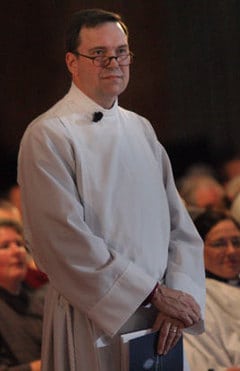 Religious figures most often extract from their faith when speaking for or against marriage equality. Their spiritual life either confirms or condemns equality.
Religious figures most often extract from their faith when speaking for or against marriage equality. Their spiritual life either confirms or condemns equality.
Bishop Nick Knisely, the Episcopal Bishop for Rhode Island, bucked that trend by citing both faith and science when he declared his support for marriage equality this weekend. He has weighed the empirical evidence and he has seen the light, he says.
"Part of what informs my opinionis that before I became a priest and then a bishop, I was a scientist. So Iknow the importance of trusting evidence that we see with our own eyes," he writes in a letter being distributed to parishioners this weekend.
I haveseen what St. Paul describes as the fruits of the Holy Spirit (Galatians5:22-23) in the married lives of two men and of two women. I have seenrelationships that are loving, mutual, and monogamous and that have lasted alifetime. Jesus tells us that we must test each tree by looking at the goodnessof its fruit (Luke 6:43-45).Across our congregations andcommunities, I can see the goodness of gay and lesbian couples and theirfamilies.
Rhode Island's state House will vote on marriage equality next week. Before that, they – and you – should really read Knisely's letter. I've included it AFTER THE JUMP.
You should also check out Bishop Knisely's blog, Entangled States, where he regularly blurs the lines between religion and science.
Statement on Marriage Equality Legislation in Rhode Island
As the Episcopal Bishop of Rhode Island, I support the bill before the General Assembly that would allow same-sex couples to marry in our state, not in spite of my Christian faith, but because of it.
Episcopalians are not unanimous in our views, but in the Episcopal Church we find our unity in common prayer, not in common opinion. Even so, through many years of prayerful discussion, the majority of Christians in the Episcopal Church have come to believe that it is possible, and even common, for two people of the same-sex to live covenanted, faithful lives together in service to God, just as people in traditional marriages do. We have also learned that it is possible to protect the consciences of those who disagree within our church and still live together in community.
Part of what informs my opinion is that before I became a priest and then a bishop, I was a scientist. So I know the importance of trusting evidence that we see with our own eyes. I have seen what St. Paul describes as the fruits of the Holy Spirit (Galatians 5:22-23) in the married lives of two men and of two women. I have seen relationships that are loving, mutual, and monogamous and that have lasted a lifetime. Jesus tells us that we must test each tree by looking at the goodness of its fruit (Luke 6:43-45). Across our congregations and communities, I can see the goodness of gay and lesbian couples and their families.
The Episcopal Church has been blessed for many years by the life and ministry of gay and lesbian couples, both lay and ordained. I have seen how they contribute to the common good of a congregation and a community by creating stable, loving homes. As a new citizen of Rhode Island, I am eager to see our state legislature join many others across the country in passing legislation to ensure civil marriage equality. I believe it is time for the State of Rhode Island to extend marriage equality to all of its citizens. I urge the legislature to pass House Bill 5015.
The Rt. Rev. W. Nicholas Knisely
Bishop of the Episcopal Diocese of Rhode Island


